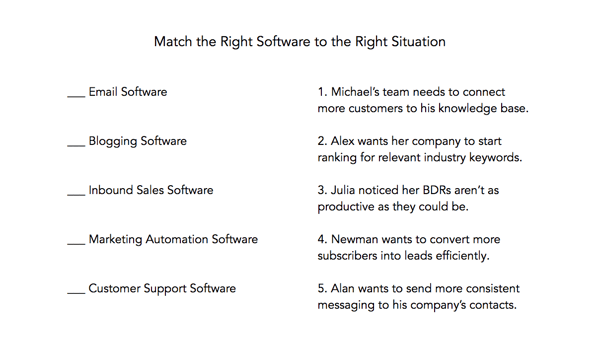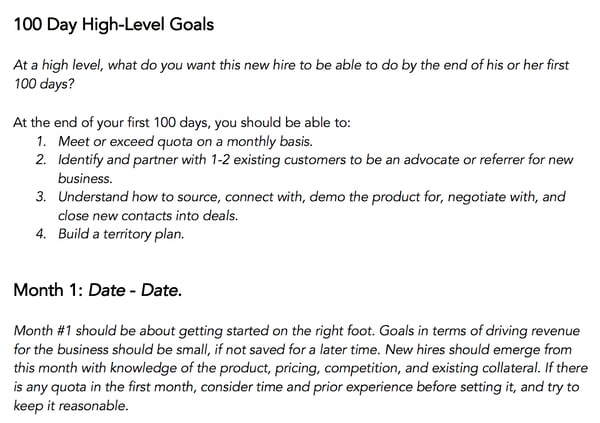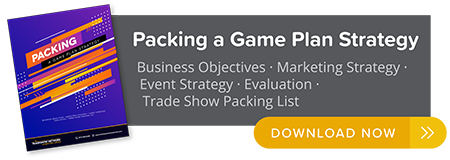There are nearly 15 million salespeople working in the United States, and they spend weeks or even months training for success in their role. Given the different responsibilities, industries, and team structures salespeople encounter, it’s hard to recommend a one-size-fits-all approach to sales training. Your reps need to learn and retain all of the company-specific skills and knowledge in order to succeed in their jobs. That’s why we’ve made a list of the best sales training ideas, activities, and games. Read through the list to determine the best tactics and programs to use when training your sales team at trade show event and in your booth!
Sales Training Ideas
- Use a sales training template

- Subscribe to industry publications, newsletters, and podcasts
- Objection handling training exercises
- Get certified
- Host success (and failure) panels
- Listening to and assessing call recordings
- Present your buyer’s journey
- Conduct a competitive analysis
- Shadow programs
- List your potholes
1. Use a sales training template [Featured Resource]
Download This Template for Free
A sales training and onboarding plan consolidates role expectations, training timelines, and resources into one place for your newly hired salespeople.
Since every sales team has different goals and expectations, it’s important to craft a custom training plan specifically for your new sales hires.
This template is pre-filled with the sections you’ll find on most sales training plans. You can use it to build out a more detailed and specific onboarding plan for your organization.
2. Subscribe to industry publications, newsletters, and podcasts
One of the mottos we love here at HubSpot is "Always be learning."
Complacency can kill in a sales job, so encourage salespeople to listen to sales podcasts and subscribe to newsletters from the best sales blogs, regardless of where they are in their career. As the industry shifts and new thought leaders emerge, reps can use the knowledge from these publications to stay in touch with new best practices and continuously build their knowledge base.
3. Objection handling training exercises
I once spoke to a software engineer who described his job as "coming in and figuring out how to break our software everyday." He and his team worked to determine the best ways to ensure that the break or breach wouldn’t happen.
Why not take a similar approach with your sales team?
Have your reps come up with all of the reasons they’ve heard why someone would reject your product. Then, have them develop — on their own or in groups — the most convincing counters to those objections. That way they’ll be locked and loaded when someone brings that concern up on a call.
4. Get certified
Strengthen your team’s understanding of selling best practices by requiring or suggesting they acquire a useful sales certification. For example, HubSpot Academy has a free Inbound Sales Certification and Course available online, including insights and advice from industry experts. The course has been taken thousands of times and can be a helpful step in making salespeople better at their jobs.
5. Host success (and failure) panels
Honesty goes a long way in training, as do personal connections.
Hosting panels with salespeople in your org that highlight their stories of success can serve as guidance and inspiration to both new and existing salespeople.
However, what might be even more valuable is a sales failure panel. Reps can open up about a time where they fell short, didn’t make the deal, or didn’t achieve the outcome they were expecting. More importantly, they can explain what they learned and how they addressed the problem next time.
6. Listening to and assessing call recordings
Sometimes referred to as "What did you hear?" this sales training exercise involves playing recorded sales calls or meetings and discerning the good, the bad, and the ugly.
Listen to the call alongside your rep, with each of you writing down what you heard that could have been said better, or what was said that stuck out in a great way. Compare notes to see how attentive your rep is and to hear their opinion on how the call went.
This equips reps to go into calls with more confidence, the right vocabulary, and a clear direction in which to take the conversation.
7. Present your buyer’s journey
After new hires are trained, have them give a presentation on what the typical buyer’s journey looks like for your product or service.
The presentation could follow one of your buyer personas realizing their problem, looking for solutions, how they stumbled upon your business, and what made them choose to do business with you.
This will make salespeople sympathetic to their future customers’ problems, get a grip on the entire sales cycle, and understand how your product/service is actually helpful.
8. Conduct a competitive analysis
"Keep your friends close, but your enemies closer." Chances are, your company has some insight into your competition. You might even have an entire competitive analysis team. However, your new sales hire might not know all of your comparative strengths and weaknesses, even though those points may come up on their very first sales call.
Having reps conduct their own competitive analysis offers many benefits for you and your company. For example:
- It exposes your reps to what internal documentation you already have on the subject.
- It can focus on one specific aspect of your product/service for a more thorough deep dive.
- It compares you to your competition with a fresh set of eyes, which could offer new talking points and arguments for future sales situations.
9. Shadow programs
Here’s where you’ll pair a new sales rep with a more established, successful one. The existing rep can walk new hires through the day-to-day of the job, show what success looks like, and serve as a mentor for personal and professional growth.
10. List your potholes
Dan Tyre, a sales director here at HubSpot, recommends a tactic to foster self-reflection and personal growth in new hires. He suggests new reps set up a written list or spreadsheet of the three "potholes" they fall into each day, as a way of holding themselves accountable, taking risks, and reviewing growth opportunities.
Sales Training Games
- Sell me this pen
- Match the product to the person
- What’s a [Company/product name]?
- Jeopardy! product quiz
- E-pitch competitions
- In-session pop quizzes
- Next logical question
1. Sell me this pen
Ever seen "The Wolf of Wall Street"?
As real-life investor (and crook) Jordan Belfort, Leonardo DiCaprio delivers this line to a group of colleagues in an impromptu selling exercise, challenging them to create a need in the eyes of a potential buyer.
The challenge could involve picking anything in the room or office. Task your reps with identifying what the problem is to which the obscure item is the solution. From there, in a mock selling situation with a prospect (either another new rep or someone on the training team), have the rep try to get the prospect to identify the need themselves, and provide the solution (in this case, the obscure product).
2. Match the product to the person
If your business sells multiple products, software, or upgrades, make a list of the key ones. Then, write out a one or two-sentence scenario where a potential customer would benefit from it.
Shuffle both lists and have salespeople match the problem to the solution so they can determine when someone is a good candidate for a certain solution. Here’s an example of what that might look like.

3. What’s a [Company/product name]?
Keep new hires on their toes with this fun activity.
After a new sales class is onboarded, inform them that the rest of the company has been instructed to — at any time during the work day — approach new sales hires and ask, "What’s a … ", followed by the name of your company, your product, or your software.
On a moment’s notice, and without hesitation, salespeople should be ready to explain what it is that they are selling in a concise, convincing, and clear way. This is especially true if your company sells a complex software or if it’s a newer, lesser-known company.
As an added bonus, this can serve as an introduction for new hires to employees from other departments.
4. Jeopardy! product quiz
At the end of your training, quiz new hires on five to 10 different categories, with each category containing five questions of increasing difficulty and point value. This game is particularly effective with a big onboarding class or for retraining a large group of existing reps.
If you’re in need of a Jeopardy! style template, Lifewire has compiled a resourceful list of templates you can use to quiz your salespeople on product training.
5. E-pitch competitions
The concept of the elevator pitch (or e–pitch) is simple — you’re in an elevator with somebody you’re trying to sell to, and have only 30-60 seconds to make your case before that person gets off the elevator.
E-pitch competitions are a staple for new hire training, as they force reps to get the value of a product out clearly and quickly. However, you can also run e-pitch competitions for continued sales training, putting random objects or ideas in a hat and challenging existing salespeople to pick one at random and brainstorm a pitch to work on their public speaking, persuasion, and brevity skills.
6. In-session pop quizzes
One of the best ways for your reps to retain information could be for you to reinforce it during the training. Spontaneous pop quizzes during training and onboarding sessions can keep your salespeople engaged, particularly if the testing is gamified.
You can use mobile-based quiz platforms like Kahoot to put the quiz right in the hands of your trainees, ensure everyone’s involvement, and analyze where the gaps in data are in your group afterwards.
7. Next logical question
In large new hire classes, role play as a prospect and have reps take turns asking the next logical question following the statement you’ve made.
For example, a rep might ask you "What made you reach out for more information?" You would then express a common problem a potential customer might look to your company to solve. Then, the rep needs to figure out the best question to ask in response to that need.
If the answer is all wrong, or if there is a silence in the room, you get to chime in and give guidance on what could be asked. Keep track, and the person who asks the most logical next questions wins.
No matter what sales training ideas, games, or activities you’re using in your office, they should serve the ultimate purpose of making salespeople better at their jobs. Ross Nibur, Director of Revenue Operations and Strategy (and former Director of Business Development) at Toast, proposes a four-step process to developing and implementing any sales training idea.
Sequentially, sales trainers should answer these four questions:
- What knowledge or skill do I want salespeople to acquire?
- Why are those skills important to them and to business growth?
- How can we ensure salespeople retain this knowledge?
- How can we support salespeople if they are struggling to learn the skill?
So, for example, you may decide you want your salespeople to become experts in your product. That answers question one. This information is important so reps can speak knowledgeably about products to prospects, set proper expectations for the end user, and earn the trust of those they’re talking to, answering question two.
Question three is where you match a training idea or activity to teach or outline the learning you want to highlight, so maybe you decide that a sales rep giving a successful product demo is the best training idea for addressing this need.
As for question four, new reps who fall short on their demo might be given access to additional documentation, recordings of successful demos, or demo coaching sessions to strengthen their skills.
That’s an example of a training idea implemented with purpose, a clear goal, and actionable next steps to ensure the knowledge and skills and retained.
Guest blogger: https://blog.hubspot.com/sales/sales-training-ideas

An introductory guide to inbound marketing
Get to grips with marketing in the digital age
Lorem ipsum dolor sit amet, consectetur adipiscing elit. Suspendisse varius enim in eros elementum tristique. Duis cursus, mi quis viverra ornare, eros dolor interdum nulla, ut commodo diam libero vitae erat.





